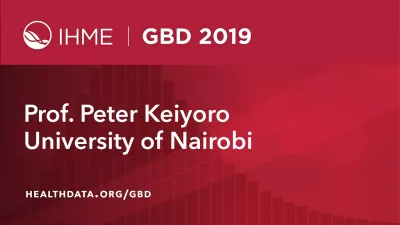
Professor Peter Keiyoro of the University of Nairobi in Kenya, a collaborator of the Global Burden of Disease Study for six years, describes how the GBD has guided the Kenyan government into a national universal health coverage program. Additionally, GBD data laid the foundation for the Kenyan government to launch a pilot program that addresses water availability, sanitation, nutrition, child hygiene, under-five mortality, maternal health, and insurance coverage and health policies.
Transcription: I am Professor Peter Keiyoro of the University of Nairobi, Kenya and I have been a GBD collaborator for the last six years. The Global Burden of Disease findings and data are now guiding our government in the national universal health coverage program. This program aspires that by the year 2022, all persons in the country will have access to health care services for their well being without the risk of financial constraints. Through utilization of the GBD data, the pilot implementation phase was launched in 2018 to cover four counties and focus on water availability, sanitation, nutrition, child hygiene, under-five mortality, maternal health, and insurance coverage and health policies. This program would not have been in existence without the availability of the GBD data and findings. Thank you. About IHME: The Institute for Health Metrics & Evaluation is an independent population health research center at UW Medicine, part of the University of Washington, that provides rigorous and comparable measurement of the world's most important health problems and evaluates the strategies used to address them. IHME makes this information freely available so that policymakers have the evidence they need to make informed decisions about how to allocate resources to best improve population health.